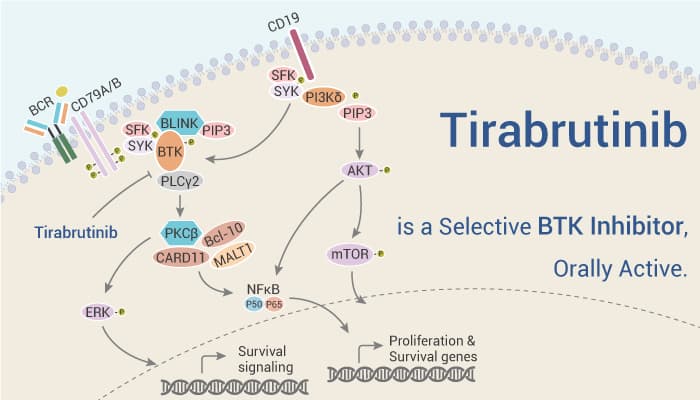The BTK kinases comprise 5 structural domains, including pleckstrin homology, TEC homology, Src homology, Src homology, and kinase domains.
The activation of BTK kinase depends on recruitment to the plasma membrane via the pleckstrin homology domain.
In humans, BTK mutations result in arrested B-cell development. Besides, it leads to severe agammaglobulinemia. BTK is a functional therapeutic target and is used for the development of small-molecule BTK inhibitors for the treatment of B-cell malignancies and autoimmune conditions. Additionally, An interesting feature of the adenosine triphosphate–a binding pocket of BTK is the presence of a cysteine residue at 481.
The first-in-class irreversible BTK inhibitor, ibrutinib. Ibrutinib approves for the treatment of chronic lymphocytic leukemia (CLL), mantle cell lymphoma (MCL), and Waldenström macroglobulinemia (WM). However, ibrutinib may cause some significant toxicities. And they include bleeding, arthralgia, diarrhea, and atrial fibrillation (AF).
As a result, it is necessary to develop a novel selective inhibitor, Tirabrutinib.

Tirabrutinib is a selective and novel inhibitor of BTK.
Tirabrutinib inhibits BTK activity with an IC50 of 2 nmol/L. Besides, The compound covalently bonds to BTK, inhibiting BCR signaling and B-cell proliferation and activation.
Additionally, it induces classical apoptosis at nanomolar concentrations in the activated B-cell diffuse large B-cell lymphoma (DLBCL) cell line.
As an orally active inhibitor, Tirabrutinib results in significant inhibition of tumor growth. What’s more, Tirabrutinib demonstrates therapeutic efficacy in a mouse arthritis model. And this effect is based on its anti-proliferative activity in B-cells.
Combination therapy can reduce activation of escape pathways and deepen responses.
As a result, Tirabrutinib in combination with idelalisib or entospletinib exhibits good effects. It is well tolerated in patients with CLL. And the combination establishes an acceptable safety profile for concurrent selective inhibition of BTK with either PI3Kδ or SYK.
In conclusion, Tirabrutinib, as a potent BTK inhibitor, it exhibits anti-tumor effects in vivo and in vitro.
Reference:
[1]. Burger JA. Curr Hematol Malig Rep, 2014 Mar, 9(1):44-9.
[2]. Harriet S. Walter et al. Blood, 2016 Jan 28, 127(4): 411-419.